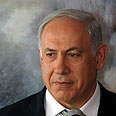The above understandings allayed tensions between Jerusalem and Washington ahead of the PM's upcoming trip to the US. Now, officials at the Prime Minister's Office are hoping for a meeting between Netanyahu and US President Barack Obama.
The US Administration recently pressed Israel to start discussing the question of borders as the first core issue. The argument put forth by the US was that the moment borders are agreed upon, there would be no construction freeze problem and each side would be able to build in its own territory.
'Shas called Netanyahu's bluff'
Netanyahu will arrive in the US while senior columnists are throwing harsh accusations at him. Following Thomas Friedman in the New York Times, David Ignatius of the Washington Post wrote Sunday that after Israel put the Jerusalem issue on the table, the Obama administration must not take it off.
"The east Jerusalem move wasn't an accident but an emphatic public statement of the Israeli right's rejection of concessions on Jerusalem. Prime Minister Binyamin Netanyahu had been trying to play along with US requests to fuzz the issue by avoiding provocative actions on Jerusalem. But the right-wing Shas party, which controls the Interior Ministry, basically called his bluff," Ignatius wrote.

Building to be delayed. Disputed Ramat Shlomo neighborhood (Photo: Reuters)
He added that after the Israeli Right put the Jerusalem issue on the agenda, "the administration's best strategy is to do what it considered a year ago, which is to state clearly the basic principles that must frame these negotiations. Those guidelines have been articulated well by Zbigniew Brzezinski, the former national security advisor: Real sharing of Jerusalem; no right of return for the Palestinians; a return to the 1967 borders, with mutual adjustments to allow for big Israeli settlement blocks; and a demilitarized Palestinian state."
He noted that every negotiation for the past four decades had converged towards those same parameters, and his conclusion was that the step-by-step approach was a mistake.
"Jerusalem is the hardest issue of all in the Israeli-Palestinian negotiation, and for that reason, would-be peacemakers have wanted to save it for last. But this month's crisis makes that strategic waffling impossible. Thanks to the Israeli right, the Jerusalem issue is joined."
Ignatius suggested that "what's needed now is for Obama to announce that when negotiations begin, the United States will state its views about Jerusalem and other key issues – sketching the outlines of the deal that most Israelis and Palestinians want. If Netanyahu refuses to play, then we have a real crisis in US-Israeli relations."
Meanwhile, US Special Envoy George Mitchell will be arriving in Jerusalem Sunday and meet Netanyahu. The prime minister will inform Mitchell, and possibly the Israeli public as well, of the series of gestures he agreed to in order to facilitate the proximity talks with the Palestinians.
The gestures will apparently include much stricter supervision by the PM himself over east Jerusalem construction. According to senior government ministers, this would mean a slowdown in Jewish construction - both government-funded and private - beyond the Green Line in Jerusalem.
The gestures will also include several steps meant to boost Palestinian President Mahmoud Abbas, such as a prisoner release.
Over the weekend, the prime minister worked on drafting his speech at the AIPAC Conference next week. Netanyahu's aides said that the speech will be "powerful and significant" and will likely deal with Israel-US ties in an effort to allay the recent tensions as result of Israel's construction announcement in east Jerusalem during President Joe Biden's visit.
Yitzhak Benhorin contributed to the story
















